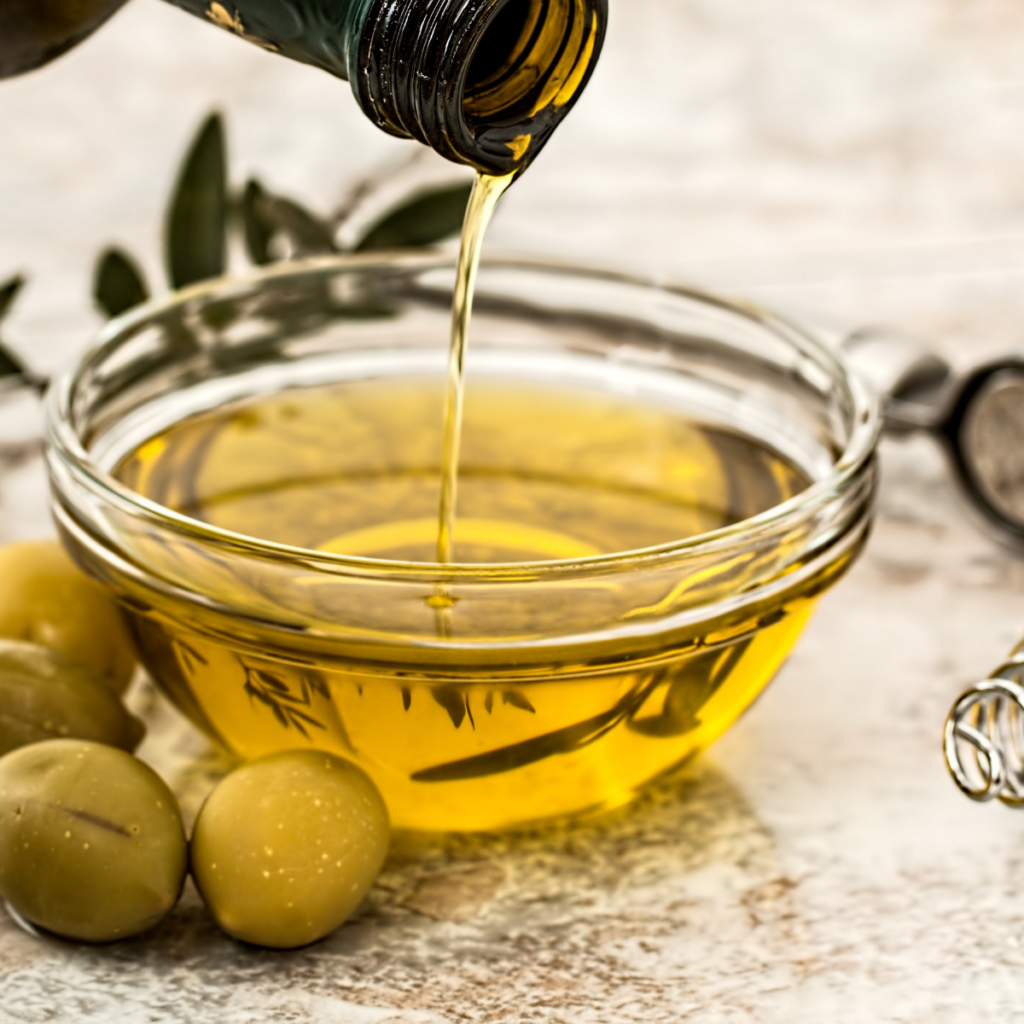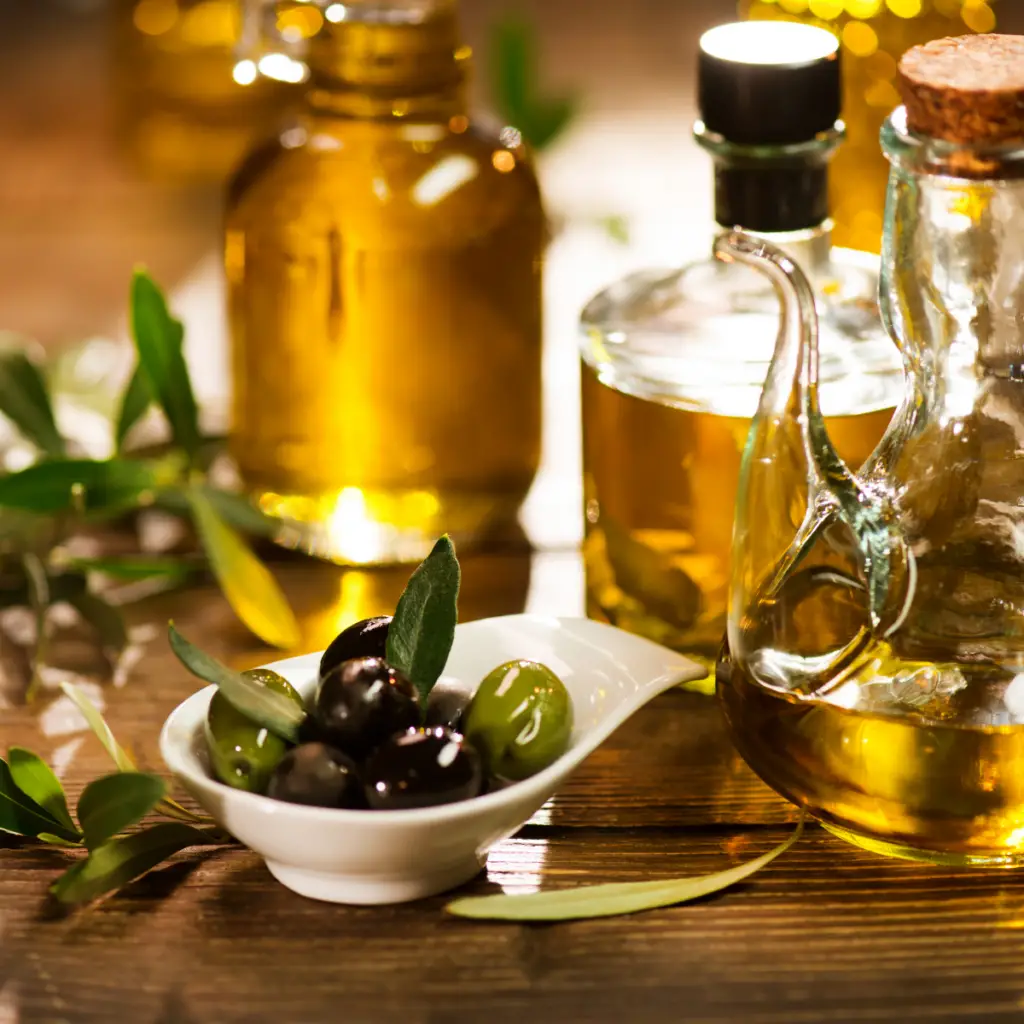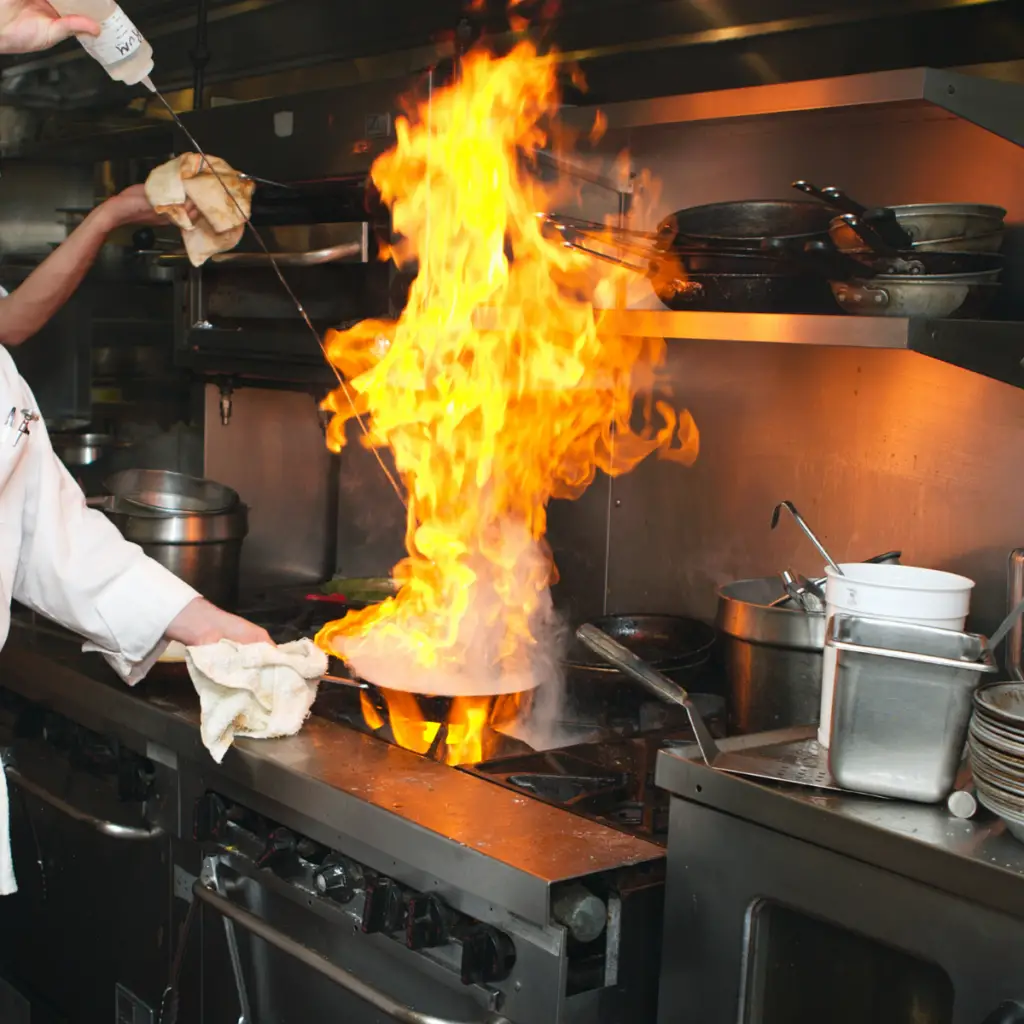Olive oil is touted for its health benefits, so many people would keep it handy in their kitchens. But is olive oil flammable? Will olive oil can catch fire? You are about to find out.

If you want to be healthy, one of the main ingredients you should look out for is olive oil. Olive oil is a prime ingredient in Mediterranean dishes, and it helps enhance the flavors of most dishes. But the main reason why people turn to olive oil instead of other cooking oils is that it provides a lot of health benefits.
Is olive oil flammable? The short answer is: olive oil is flammable but it won’t catch fire so easily.
In this article, we’ll answer the following questions:
- What is olive oil?
- What is olive oils flashpoint, ignition point, smoke point and boiling point?
- Does olive oil cause grease fire?
What is Olive Oil?
Olive oil is obtained from the fruits of olive trees which are common in the Mediterranean region. Olive oil is produced by extracting the oil through manual or chemical methods.
If you have been cooking with olive oil, then you would know that there are different types of olive oil.
Extra Virgin Olive Oil

Extra virgin olive oil is made from the initial cold-pressing of olives. It has a strong flavor, making it perfect for salads and seasonings.
Virgin Olive Oil
Virgin olive oil comes from the second pressing of olives and it has a milder flavor than that extra virgin olive oil. It is best used for sauteing and cooking in medium heat.
Refined Olive Oil
Refined olive oil comes from black and ripe olives. It is also often marketed as regular olive oil and contains the least amount of healthy fats that come from virgin and extra virgin olive oil. It is often used in cooking with high heat.
Pure Olive Oil
Although it is called pure olive oil, it isn’t pure at all. It is made from the oil residues after cold-pressing the olives and is then mixed with virgin olive oil to improve its quality. Pure olive oil is used for cooking and deep-frying and is also often used in massages.
Related Posts:
- Is Peppermint Oil Flammable?
- Is Coconut Oil Flammable?
- 11 Flammable Household Items To Handle with Caution
- Is Vegetable Oil Flammable? Does It Catch Fire?
- Is Powdered Creamer Flammable?
This post contains affiliate links. I may earn a small commission at NO extra cost to you for purchases made through these links. Disclosure.
Is Olive Oil Flammable? Is It Combustible?
So we go back to the question: is olive oil flammable? And is it combustible?
Yes, olive oil is flammable. But it is not very volatile, so it won’t catch fire so easily. However, olive oil does burn easily, so it’s not recommended to use olive oil, especially extra virgin olive oil, for high heat cooking.
Flammable liquids have a flash point of under 100 degrees Fahrenheit so they may produce vapors even at room temperature.
Combustible liquids, on the other hand, have flashpoints over 100 degrees Fahrenheit and produce vapors when exposed to a high temperature.
Related Post:
What Is The Hottest Color of Fire
Understanding Olive Oil’s Flashpoint, Ignition Point, Smoke Point, and Boiling Point
There are a couple of points to consider why we can say that olive oil is flammable, but not that volatile.
Flash point
First, let’s discuss the flashpoint of olive oil.
Flash point is the minimum temperature at which a liquid creates vapor and ignites in the air. As for olive oil, it has a flashpoint of 410 degrees Fahrenheit.
It is possible to encounter this temperature while cooking in the kitchen. And when olive oil reaches its flash point, it will start to burn and produce toxic smoke. Cooking with olive oil in high heat or temperature may break down its nutritional properties.
But according to some experts, high-quality extra virgin olive oil may be able to withstand high heat. It is fairly stable and will retain most of its antioxidant content despite being exposed to high heat.
Smoke Point
All cooking oils have smoke points, the temperature at which they start to produce serious smoke after being exposed to high temperatures.
It is important to understand the smoke point in your cooking oil because letting it go over its smoke point will break down the oil’s properties. It also results in the burnt taste and aroma of your food.
The smoke point of olive oil is below its flashpoint. Extra virgin olive oil has a smoke point of 350 degrees Fahrenheit to 410 degrees Fahrenheit. Meanwhile, refined olive oil has a higher smoke point of between 390⁰ – 470⁰ F.
Ignition Point
Olive oil has a high ignition point of 435 degrees Fahrenheit. When it reaches its ignition temperature, spontaneous combustion may occur.
Fortunately, it is unlikely that olive oil would spontaneously combust as most people wouldn’t be normally cooking at such a high temperature.
Boiling Point
The boiling point of olive oil is even so much higher standing at around 570 degrees Fahrenheit. Again, this temperature is not normally achieved in the kitchen.
Still, if you notice that olive oil has come to a rolling boil, it is best to turn off the heat source immediately. Do not touch or move scaldingly hot olive oil to prevent any burn or injury.
What Happens When You Cook Olive Oil in High Heat?
Given that olive oil is not as flammable as other cooking oils, then you should be able to cook olive oil in high heat if that’s your preferred cooking method.
The reason why most health experts believe that you should not cook olive oil in high heat is that high temperatures can break down olive oil’s properties and cause the formation of toxins and carcinogenic compounds.
That’s the main reason why olive oil is mostly used for low and medium-heat dishes. Olive oil is perfect for salad dressings and sauteing.
However, if you’d really want to cook olive oil in high heat, then it’s best to choose high-quality extra virgin olive oil. Extra virgin olive oil has not been mixed with other oils, so it is more stable than refined olive oil. Its compounds are less likely to break down even when heated to a high temperature.
Does Olive Oil Cause Grease Fire?

Even with the fact that olive oil is flammable, you wouldn’t have to worry about it causing a grease fire unless you heat it up beyond its flash point.
Before olive oil becomes dangerously hot and potentially causes a grease fire, it would first show signs it is about to become flammable. You would smell it burning and see the oil come to a rolling boil.
That is the reason why you should not leave your cooking unattended in the kitchen. Despite the fact that you are not cooking olive oil at 400 degrees, every flammable liquid has the potential to catch fire when exposed to a certain temperature for a period of time.
Related Posts:
Related Questions
What temperature is too high for olive oil?
You can heat extra virgin olive oil to as high as 400 degrees without worrying about it catching on fire. But olive oil has an ignition point of 435 degrees Fahrenheit, at which point, it may spontaneously combust and catch on fire.
Does olive oil burn easily?
It depends on the purity and quality of the olive oil. In most cases, high-quality extra virgin olive oil does not burn easily and can be heated without any concerns. However, if you are using olive oil of lower quality, it is best to use it for appropriate cooking methods.
Can you bake olive oil at 425?
Yes, you can bake olive oil at over 400 degrees. When combined with the rest of the food ingredients, it is unlikely that olive oil will even reach 425 degrees. Additionally, the smoke point in cooking oils should not be your sole consideration when cooking which oil to cook with. Stability is much more important, and extra virgin olive oil has the highest stability among other cooking oils.
Can cooking oil ignite a fire?
Yes, cooking oil can ignite a fire. This happens when you leave cooking oil at a certain temperature for a period of time, and it comes to the point when it reaches its ignition point.
Can olive oil catch fire?
Yes, olive oil can catch fire, especially if you spray it as a fine mist. However, if you are cooking with olive oil under normal circumstances, olive oil will not catch fire that easily.
Conclusion
As with most cooking oils, olive oil is flammable.
It is not a good idea to let olive oil get too heated beyond its smoke point because its compounds can degrade due to high heat and diminish the health benefits it is supposed to provide.
Additionally, you shouldn’t let olive oil get too hot to the point that it smokes and burns. These are telltale signs that olive oil is becoming dangerously flammable and it could ignite at any given moment.
With all these safety measures in mind, you should be able to keep your family safe and use olive oil just fine without fear of starting kitchen fires.

Leave a Reply